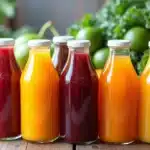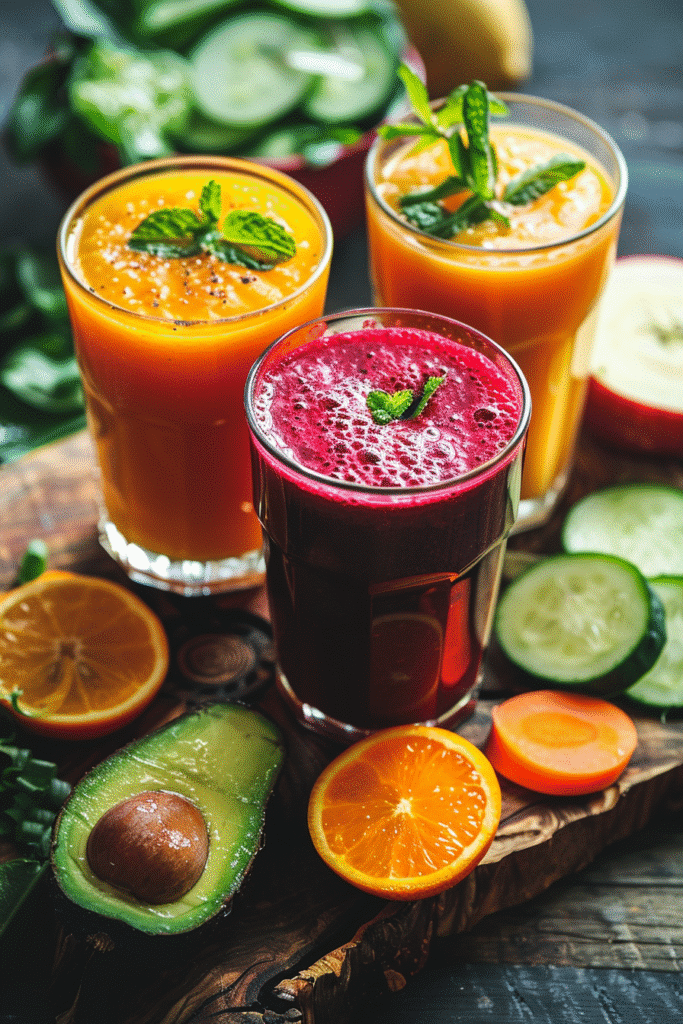
Table of Contents
A 7-day juice cleanse is a structured dietary program involving the exclusive consumption of fruit and vegetable juices for a week. This approach is gaining popularity as a wellness trend among those seeking detoxification, weight management, or a reset for their dietary habits. People are drawn to juice cleanses because of their promises to improve digestion, boost energy levels, and provide a break from processed foods. Additionally, the convenience of pre-packaged juice plans has made this regimen more accessible to busy individuals aiming to rejuvenate their bodies.
Understanding a 7-Day Juice Cleanse
What is a Juice Cleanse?
A juice cleanse is a dietary detox plan that eliminates solid foods in favor of nutrient-rich juices. These juices are typically made from fresh fruits, vegetables, and sometimes superfoods such as ginger, turmeric, or spirulina. The intended benefits of juice cleansing include:
- Detoxification: Helping the body eliminate toxins.
- Weight Loss: Providing a calorie-controlled alternative to regular meals.
- Improved Digestion: Allowing the digestive system to rest and reset.
- Enhanced Energy Levels: Delivering a concentrated dose of vitamins and minerals.
How a 7-Day Juice Cleanse Differs
A 7-day juice cleanse differs significantly from shorter cleanses, such as 1-day or 3-day programs, in both intensity and outcomes:
- Duration and Adaptation: While shorter cleanses offer a quick detox, a week-long cleanse provides the body with more time to adjust and experience potential benefits fully. This longer duration may lead to deeper detoxification and sustained mental clarity.
- Discipline and Commitment: A 7-day plan requires greater focus and preparation, as it involves overcoming more cravings and potential detox symptoms like fatigue or headaches.
- Results: A week-long cleanse has the potential to yield more noticeable results in terms of weight loss, skin clarity, and digestion improvements compared to shorter cleanses.
- Risks: Prolonged cleansing might also come with challenges such as nutrient deficiencies if not properly planned or monitored, underscoring the need for careful execution and consideration of individual health conditions.
Benefits of Juicing for 7 Days
A 7-day juice cleanse offers a range of potential benefits, especially when done with proper planning and using nutrient-rich ingredients. Here’s a breakdown of the key advantages:
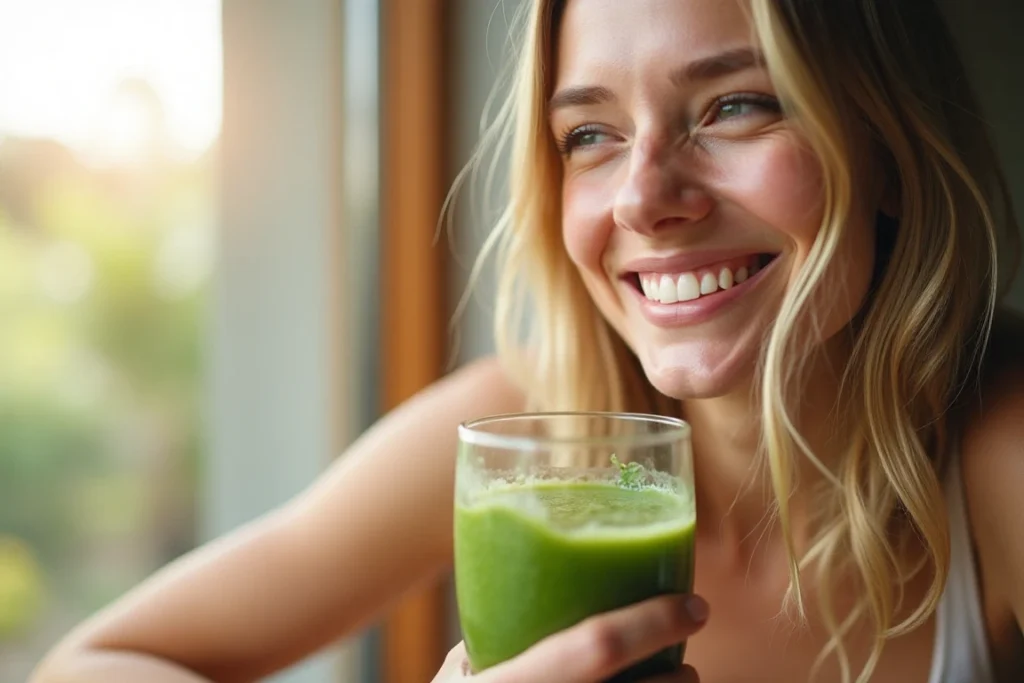
Nutritional Boost
Fresh juices are a powerhouse of vitamins, minerals, and antioxidants. By consuming a variety of fruits and vegetables in juice form, individuals can significantly increase their intake of nutrients like Vitamin C, potassium, and folate. These nutrients can:
- Support the immune system.
- Improve cellular health and repair.
- Combat oxidative stress with antioxidants.
Drinking freshly pressed juice provides a concentrated dose of nutrients without the bulk of fiber, making it easier for the body to absorb and utilize these essential compounds.
Weight Loss Benefits
A 7-day juice cleanse typically involves a reduced calorie intake while still supplying essential nutrients. This caloric deficit can contribute to weight loss, particularly for those looking to shed water weight or jumpstart healthier eating habits. Additional weight loss benefits include:
- Lowered consumption of processed foods and sugars.
- Encouraging mindful eating post-cleanse due to heightened awareness of food choices.
- Reduced bloating from the elimination of high-sodium foods.
It’s important to note that sustained weight loss requires lifestyle changes beyond the cleanse.
Improved Digestion
Juicing allows the digestive system to take a much-needed break from processing solid foods. The absence of heavy meals can:
- Reduce inflammation in the gut.
- Promote better nutrient absorption.
- Help alleviate digestive discomfort, such as bloating or constipation.
This “reset” can be particularly beneficial for those with diets high in processed foods or those experiencing digestive issues.
Hydration and Skin Health
Juicing significantly boosts hydration levels, as many fruits and vegetables, such as cucumbers, watermelons, and celery, have high water content. Enhanced hydration can:
- Improve skin elasticity and clarity.
- Flush out toxins, leading to a glowing complexion.
- Enhance overall hydration levels, supporting bodily functions like circulation and joint health.
Additionally, the antioxidants found in fresh juices combat free radicals, further improving skin health and reducing signs of aging.
Risks and Concerns of a 7-Day Juice Cleanse
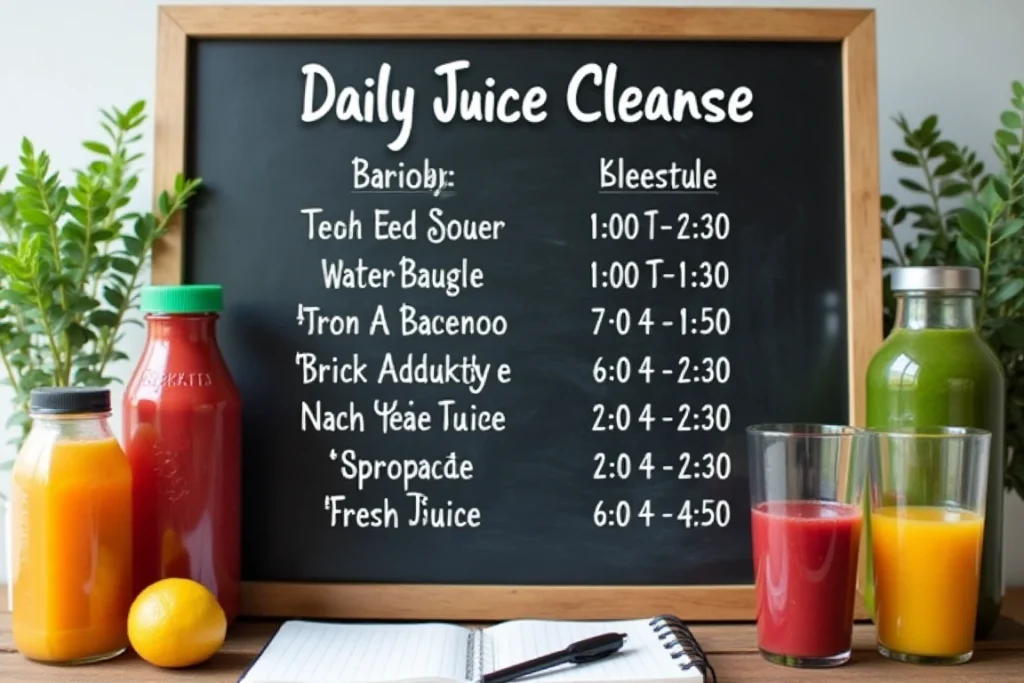
While a 7-day juice cleanse may have appealing benefits, it’s essential to recognize potential risks and understand who should avoid such programs.
Blood Sugar Spikes
Juices made primarily from fruits can be high in natural sugars, which can cause blood sugar levels to spike. This is particularly concerning for individuals with:
- Diabetes or insulin resistance.
- Sensitivities to sugar fluctuations, which may lead to energy crashes or dizziness.
Using a higher ratio of vegetables to fruits in juices can help mitigate this risk and stabilize blood sugar levels.
Nutritional Deficiencies
A juice cleanse typically lacks key macronutrients such as protein, fiber, and healthy fats. These nutrients are crucial for:
- Muscle maintenance and repair (protein).
- Digestive health and satiety (fiber).
- Hormonal balance and brain function (healthy fats).
Prolonged deficiency in these areas can lead to fatigue, muscle loss, and other health issues if the cleanse is not carefully managed.
Physical Symptoms
Many participants experience temporary side effects, especially in the early stages of the cleanse, including:
- Headaches: Often due to caffeine withdrawal or lower calorie intake.
- Fatigue: Reduced energy levels from insufficient calories or protein.
- Irritability: As the body adjusts to the absence of solid food.
- Digestive Changes: Diarrhea or constipation may occur due to the lack of fiber or changes in gut microbiota.
These symptoms are generally mild but can be more pronounced in sensitive individuals.
Who Should Avoid It?
Certain groups are advised against participating in a 7-day juice cleanse due to potential health risks, including:
- Pregnant or Nursing Women: Nutritional needs are higher during these stages.
- Children and Adolescents: Require a balanced diet for growth and development.
- Individuals with Medical Conditions: Such as diabetes, kidney issues, or eating disorders.
- Elderly Individuals: Who may require more stable and nutrient-rich diets.
Consulting with a healthcare provider before starting a juice cleanse is recommended for anyone with health concerns.
How to Juice Safely for 7 Days
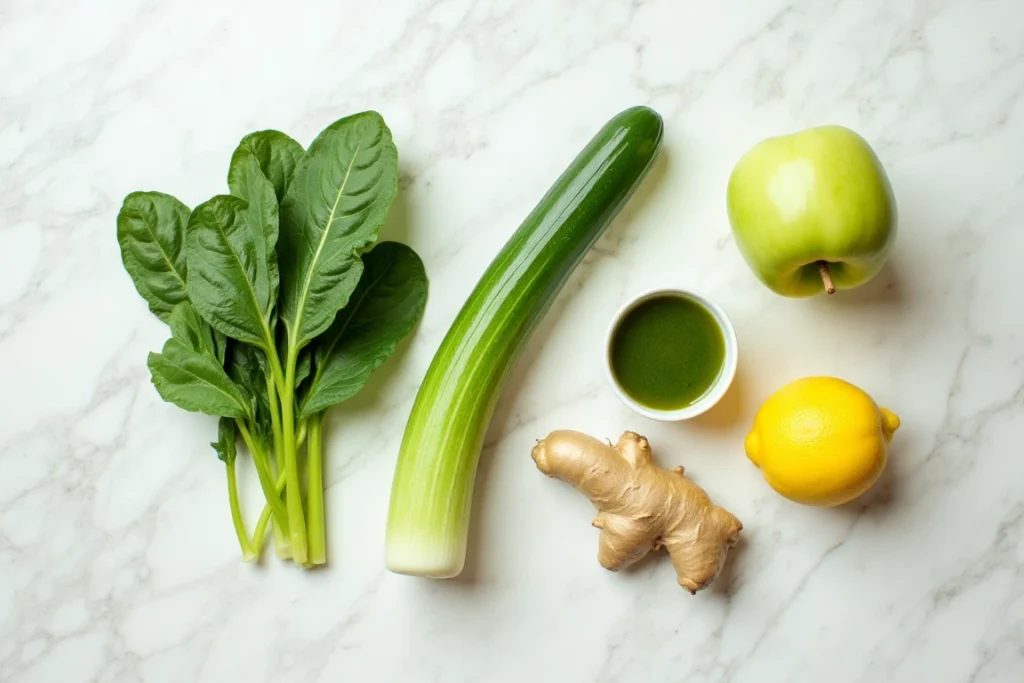
If you choose to embark on a 7-day juice cleanse, following these tips can help ensure a safer and more effective experience:
Choosing the Right Ingredients
- Prioritize low-sugar vegetables like spinach, kale, cucumber, and celery.
- Use low-glycemic fruits such as berries, green apples, or lemons.
- Incorporate herbs and superfoods like ginger, turmeric, or parsley for added health benefits.
Balancing Calories
- Use higher-calorie ingredients like avocado or coconut water sparingly to avoid extreme calorie deficits.
- Drink enough juice throughout the day to maintain energy, typically 5-6 servings daily.
- Avoid prolonged periods of hunger, which may lead to fatigue or overeating post-cleanse.
Staying Hydrated
- Drink plenty of water in addition to juices to maintain hydration.
- Herbal teas or electrolyte-infused water can help balance hydration levels and replenish minerals.
Monitoring Your Body
- Pay attention to symptoms like extreme fatigue, dizziness, or persistent headaches, which may indicate a need to adjust the cleanse.
- Consider breaking the cleanse if symptoms become severe or unsustainable.
- Stay in tune with your energy levels and mental clarity throughout the process.
Exiting the Cleanse Gradually
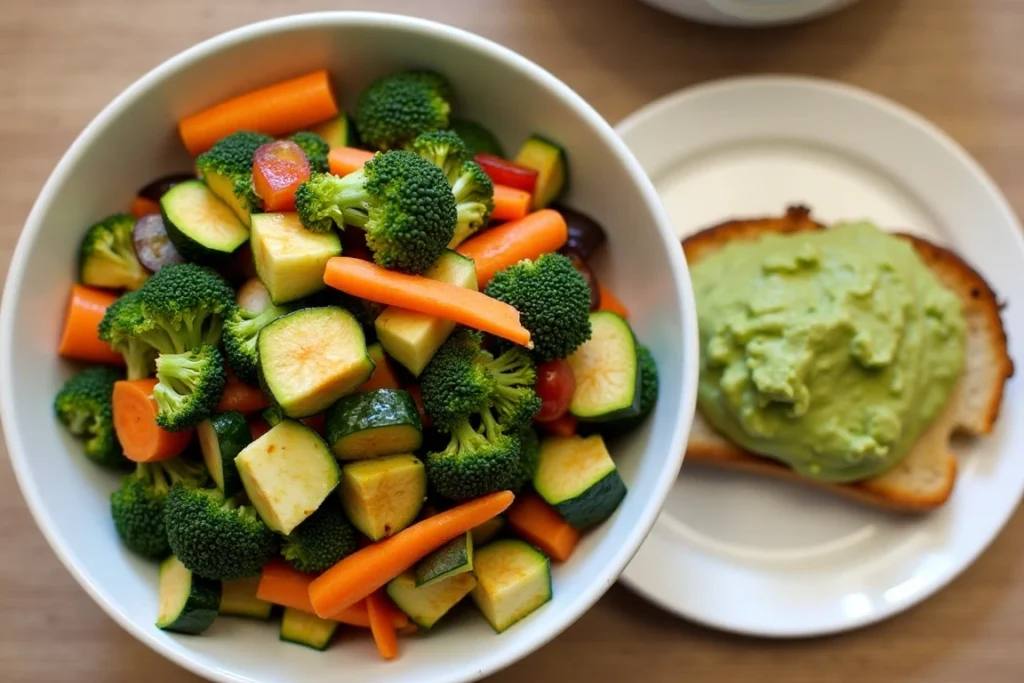
Transitioning back to solid foods is a critical step to avoid overwhelming your digestive system:
- Start with soft, easily digestible foods like soups, steamed vegetables, or smoothies.
- Gradually reintroduce lean proteins and healthy fats over the next few days.
- Avoid processed foods and sugar immediately post-cleanse to maintain benefits.
Alternatives to a 7-Day Juice Cleanse
For individuals hesitant to commit to a full 7-day juice cleanse or concerned about its potential downsides, there are alternative approaches to enjoy the benefits of juicing without entirely replacing meals.
For recipe ideas, see 50 Easy Trader Joe’s Recipes: Quick, Delicious, and Affordable Meal Ideas.
Juicing as a Supplement
Rather than relying exclusively on juices, incorporate them into a balanced diet as a way to boost nutrient intake. This approach allows for the benefits of juicing while avoiding some of the risks, such as nutrient deficiencies or extreme calorie deficits.
How to Implement:
- Replace one meal or snack per day with a nutrient-dense juice.
- Use juices to complement meals, such as having a green juice alongside a breakfast of eggs and avocado.
- Focus on juices rich in vegetables and low in sugar to keep blood sugar levels stable.
Benefits:
- Easy to integrate into daily life without disrupting eating habits.
- Provides an added dose of vitamins and minerals to support overall health.
- Avoids the side effects of extended periods without solid food.
Intermittent Fasting with Juicing
Intermittent fasting involves alternating periods of eating and fasting. Incorporating juices during fasting windows or as part of the eating phase can offer similar benefits to a full cleanse while being less restrictive.
How to Implement:
- Use juices during the fasting period to provide hydration and nutrients without solid food.
- Choose a fasting schedule that fits your lifestyle, such as the 16:8 method (16 hours of fasting, 8 hours of eating).
- During the eating window, focus on whole, nutrient-rich foods to balance your diet.
Benefits:
- Encourages better digestion and metabolism without prolonged fasting on just juices.
- Offers flexibility, as you can consume solid foods during eating windows.
- May improve focus and energy levels during fasting periods by providing easily digestible nutrients from juices.
FAQs
Here are answers to some of the most common questions about juice cleanses to help clarify the process and set realistic expectations.
Can I Exercise During a Juice Cleanse?
Yes, but with modifications. Since juice cleanses typically involve lower calorie and protein intake, high-intensity workouts may not be sustainable or safe.
Guidelines:
- Focus on light, low-impact activities like yoga, walking, or stretching.
- Avoid strenuous activities like heavy lifting or intense cardio that require more energy and muscle recovery.
- Listen to your body—if you feel fatigued or dizzy, scale back your activity levels.
How Much Juice Should I Drink Daily?
The general recommendation is to drink 5–6 servings (16–20 ounces each) of juice per day, spaced out evenly. This provides sufficient nutrients and calories to sustain energy levels without overconsumption.
Tips:
- Include a mix of green vegetable juices and some fruit-based options for variety and balance.
- Avoid drinking too much juice at once, which can cause blood sugar spikes.
Are Store-Bought Juices Okay?
Store-bought juices can be used, but fresh, cold-pressed juices are preferable.
Key Differences:
- Fresh Juices: Retain more nutrients, enzymes, and flavors. These are typically cold-pressed and consumed immediately.
- Processed Juices: Often pasteurized, which reduces nutrient content, and may contain added sugars or preservatives.
- If using store-bought, choose juices labeled as “cold-pressed” and check for minimal ingredients (ideally just fruits and vegetables).
What If I Feel Dizzy or Fatigued?
Dizziness or fatigue is a common symptom during a juice cleanse, especially in the early days.
What to Do:
- Stay Hydrated: Drink water between juices to support hydration and circulation.
- Include a Healthy Snack: If symptoms persist, incorporate a light, nutrient-dense snack like a handful of nuts or an avocado to stabilize energy levels.
- Rest: Give your body time to adjust and avoid overexertion.
If symptoms are severe or prolonged, discontinue the cleanse and consult a healthcare professional.
How Much Weight Can I Expect to Lose?
Weight loss during a juice cleanse varies based on individual factors like starting weight, metabolism, and activity levels.
Realistic Expectations:
- Most participants lose 2–6 pounds over a 7-day cleanse, primarily due to water weight and reduced caloric intake.
- Long-term weight maintenance requires healthy eating habits post-cleanse.
Can I Do a Juice Cleanse if I Have Health Issues?
It depends on the specific health condition. Juice cleanses may not be suitable for everyone, especially those with:
- Diabetes or Blood Sugar Issues: High-sugar juices can lead to dangerous spikes or drops in blood glucose levels.
- Kidney Problems: Excessive intake of potassium (found in many fruits and vegetables) may strain the kidneys.
- Eating Disorders: Restrictive diets can exacerbate disordered eating behaviors.
Advice:
Always consult a healthcare provider before starting a juice cleanse, particularly if you have any pre-existing medical conditions or take regular medications.
Conclusion For 7-day juice cleanse safety
A 7-day juice cleanse can be a beneficial way to reset your diet, boost nutrient intake, and support overall wellness. However, its success depends on careful planning and a clear understanding of both its benefits and risks.
Key Takeaways:
- Benefits of a Juice Cleanse:
- Delivers a concentrated source of vitamins, minerals, and hydration.
- Can support weight loss, improved digestion, and skin health.
- Potential Risks:
- Blood sugar spikes from high-sugar juices.
- Nutritional deficiencies due to a lack of protein, fiber, and healthy fats.
- Physical side effects such as fatigue, dizziness, or headaches.
- Alternatives and Safety Tips:
- Juicing as a supplement or combining intermittent fasting with juicing offers flexible alternatives.
- Focus on low-sugar, nutrient-dense ingredients, maintain hydration, and monitor your body’s responses during the cleanse.
- Transition back to solid foods gradually to avoid overwhelming your digestive system.
Love easy, healthy recipes like this? Follow me on Pinterest for more tasty ways to feel your best every day!
Final Advice:
A 7-day juice cleanse is not a one-size-fits-all solution, and its effectiveness depends on individual health, goals, and preparation. For those considering this approach:
- Consult with a healthcare professional, especially if you have existing medical conditions.
- Prioritize balance and variety in your juice recipes to ensure a broader nutrient profile.
- Pay attention to how your body feels and make adjustments as needed.
For more ideas on detox-friendly recipes, don’t miss The Ultimate Guide to Daniel Fast Breakfast Recipes.
- Five Layer Oreo Lasagna Dessert
- Simple Garlic Pasta in One Pot, Creamy and Easy for Dinner. Perfect for Picky Eaters
- Oreo Dump Cake
- Dirt Cake
- Classic Cannoli Squares
7-Day Juice Cleanse
Ingredients
Juicing Ingredients
- 5-6 servings fresh fruit and vegetable juices (e.g., spinach, kale, cucumber, celery, apples, berries, and other low-sugar fruits) Use a mix of green vegetables and low-glycemic fruits.
Hydration Items
- enough cups water Drink plenty of water in addition to juices.
- 1-2 cups herbal tea or electrolyte-infused water Can help balance hydration levels.
Instructions
Preparation
- Choose low-sugar vegetables and fruits for your juices.
- Ensure to prepare a balanced selection of juices for variety.
Juicing
- Drink 5-6 servings of juice throughout the day, spaced evenly.
- Stay hydrated by drinking plenty of water alongside the juices.
Monitoring & Exiting
- Monitor your body for any adverse symptoms such as dizziness or fatigue.
- Gradually transition back to solid foods, starting with soft and easily digestible options.

